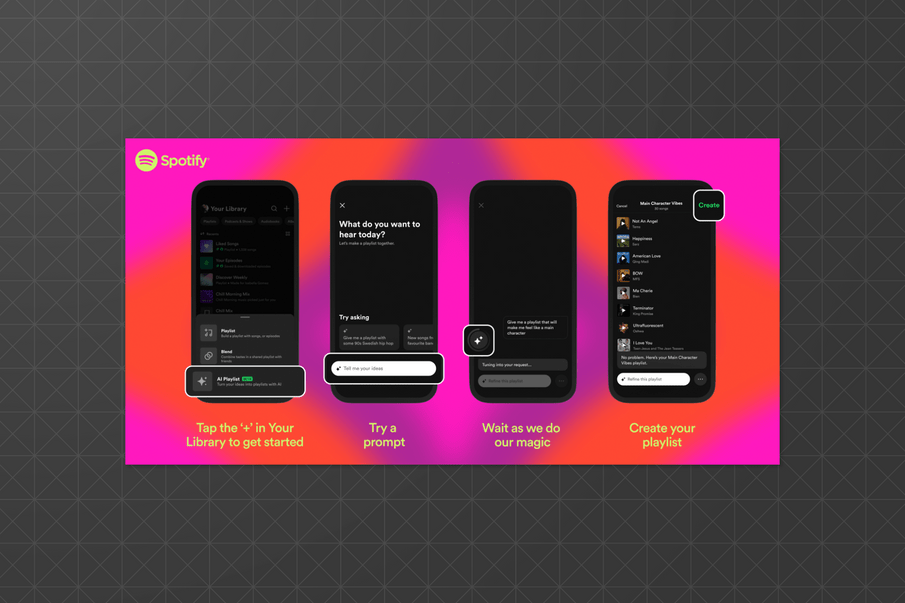AI This Week: Personalized Playlists, Enhanced Model Interactivity, and Open-Source Breakthroughs
April 12, 2024
This week in AI, we’ve seen remarkable strides across the board. Spotify unveils an AI Playlist Generator, allowing users in the UK and Australia to craft personalized music lists with simple text prompts. Anthropic’s latest update enables Claude 3 models to interact with external tools, enhancing their utility in complex tasks. Google steps up with open-source tools for generative AI, aiming to boost performance and efficiency for developers. Meanwhile, Poe introduces a per-message revenue model for AI bot creators, fostering innovation and sustainability in bot development. Let’s explore the details of these exciting developments.
Spotify Unveils AI Playlist Generator
Spotify has rolled out an innovative AI Playlist feature, enabling Premium subscribers in the UK and Australia to create playlists from text prompts. By simply describing a mood or scenario, like “music for a rainy day,” users can generate a 30-song playlist tailored to their request. This feature, still in beta, represents a leap in personalized music curation, allowing users to refine their playlists with additional prompts for an even more customized experience.
Early tests reveal the feature’s adeptness at creating thematic playlists with unique prompts, such as capturing the essence of a vampire hunter with a playlist inspired by the film Blade. However, the AI Playlist is currently limited to music-related prompts and has safeguards against offensive content.
As Spotify plans to enhance this feature, it could reshape music discovery and personalization. This move also hints at possible subscription price increases in the future.
Anthropic Enhances Claude 3 with External Tool Interactivity
Anthropic has unveiled a beta feature for the Claude 3 model family, introducing the ability for these AI models to use external tools via the Anthropic Messages API. The feature, aimed at developers, simplifies integrating complex functionalities into applications, potentially transforming how service agents, personal assistants, and data analysis tools operate.
Capabilities Unleashed
With the new feature, Claude 3 models can:
– Access documents from internal knowledge bases and APIs.
– Interact with public and vendor APIs for broader data retrieval and action-taking capabilities.
– Handle tasks necessitating real-time data or intricate computations more adeptly.
– Coordinate a suite of Claude subagents for detailed tasks, like optimizing meeting scheduling across various calendars.
Google Launches Open-Source AI Tools
Google introduced several open-source tools at this year’s Cloud Next to support generative AI development, showcasing a shift towards fostering developer engagement and ecosystem growth.
Key Announcements
– MaxDiffusion: Released quietly in February, MaxDiffusion is a set of reference implementations for diffusion models (like Stable Diffusion) optimized for XLA devices, including Google’s TPUs and recent Nvidia GPUs. This initiative aims to facilitate and accelerate AI workload processing.
– Jetstream: This new engine is tailored for running generative AI models, particularly text generators, on TPUs (with future GPU support planned). Google touts Jetstream as offering triple the “performance per dollar” for models such as Gemma 7B and Meta’s Llama 2, although details behind these claims are awaited.
– MaxText Enhancements: Google has expanded its MaxText collection, now including models like Gemma 7B, GPT-3, Llama 2, and offerings from Mistral. These models, optimized for TPUs and Nvidia GPUs, promise higher energy efficiency and cost optimization for developers.
– Collaboration with Hugging Face: The partnership has yielded Optimum TPU, a toolkit to lower the entry barrier for deploying text-generating AI models on TPUs. Currently, it supports Gemma 7B, focusing on running models rather than training them on TPUs, with plans for expansion.
Poe Launches Per-Message Earnings for AI Bot Creators
Quora’s AI chatbot platform, Poe, now offers a per-message revenue model for bot creators, allowing them to earn money each time a user interacts with their bots. Introduced on April 9, 2024, this model builds on Poe’s previous revenue-sharing program, aiming to support creators with the costs associated with bot development.
Quick Facts
– Poe centralizes access to AI chatbots from leading developers like OpenAI and Google.
– The per-message revenue model is designed to help creators cover operational expenses.
– Initially available to U.S. creators, with plans for global expansion.
– An updated analytics dashboard offers creators insights into earnings and bot performance.
This initiative represents Poe’s ongoing effort to fuel a thriving ecosystem of innovative AI bot applications, from educational tools to creative storytelling bots.
Keep ahead of the curve – join our community today!
Follow us for the latest discoveries, innovations, and discussions that shape the world of artificial intelligence.


